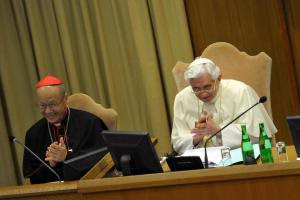by Sandro Magister
[from his Italian-only blog] Settimo Cielo
Homosexuality is per se outside of the topics of discussion at the Synod convened to discuss matters of the family. But in fact it was present in a powerful way in the debates themselves. According to the media hype, the dominant leanings in the Catholic world are for a radical change in the doctrine and practice of the Church, with the full acceptance of the practice of homosexuality and with the blessing of unions between persons of the same sex.
But there are also others who want to take a new path with respect to the pastoral ministry to homosexuals that is firmly based on Catholic doctrine. Both these approaches will be represented in Rome in these feverish days before the Synod.
The first approach will have its moment in the sun on Saturday, October 3 at the international conference with the title “Ways of Love: Snapshots of Catholic Encounters with LGBT Persons and their Families”. The program in Italian, English and Spanish can be found at waysoflove.wordpress.com. LGBT is an acronym for Lesbian, gay, bisexual and transsexual. At this meeting in Rome, they explain, they will initiate “a global network of LGBTQI Catholics”, extending the acronym to include “queer” and intersexuals. Their stated objective is “a Catholic Church in which the whole people of God—LGBT and heterosexual persons—can live, pray and offer their service together in harmony”. Speakers at the conference include Mary McAleese, the former president of Ireland, José Raúl Vera Lopez, Bishop of Saltillo in Mexico, himself a Dominican, the Jesuits Pedro Labrin from Chile and Pino Piva from Italy, the American Sister Jeannine Gramick and the Italian Sister Anna Maria Vitagliani, Martin Pendergast from England, Rungrote Tangsurakit, from Thailand, and also “a priest who works in Africa whose anonymity was requested by his superior”.

























